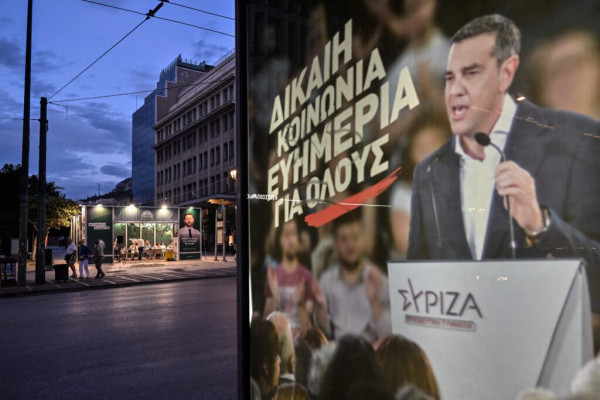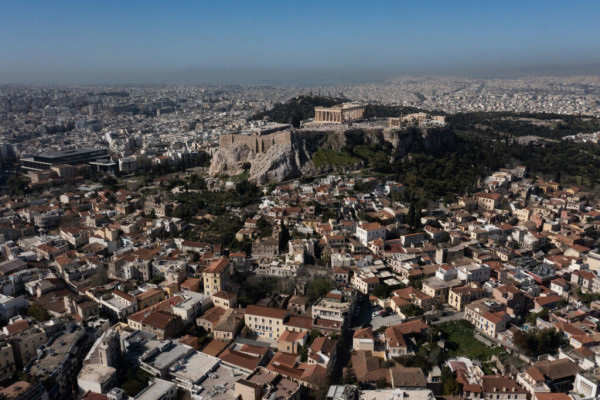Greek opposition seizes on EU funds fraud allegations
ATHENS ― Rival politicians in Greece are demanding answers over fraud accusations linked to the way €2.5 billion in EU funds was awarded to just 10 companies.
Opposition parties claim the country's center-right government, led by Prime Minister Kyriakos Mitsotakis, is "completely exposed" after POLITICO revealed that European and Greek authorities were investigating alleged malpractice. The inquiry is linked to public tenders for contracts using EU post-pandemic recovery fund money.
POLITICO reported last week that the European Public Prosecutor’s Office (EPPO) had opened a probe, while the offices of the country’s three telecoms firms — Cosmote, Vodafone and Nova — as well as five IT companies and two consultancies were raided by the Greek competition commission.
“The Greek government is completely exposed in relation to the issue of financing projects from the recovery fund,” said Syriza, the country's main opposition party. It called on the government to publish a list of companies whose projects were awarded money from the fund, known as the EU's Recovery and Resilience Facility (RRF).
The socialist Pasok party said the report confirmed its warnings “about the lack of transparency in the allocation of the RRF funds to the few and the powerful.”
Declaring it had "no confidence in how the government manages these funds,” Pasok promised to use the country's parliament to highlight potential corruption by submitting questions and requesting documents on the terms of the contracts and how they were signed.
“We are talking about a system of power whose priority is neither the good use of European resources, nor transparency in political choices, but the service of powerful economic interests," Pasok leader Nikos Androulakis said during a discussion at Delphi Economic Forum.

The investigation is the latest blow to the RRF's credibility and is an important test of whether Athens is really improving accountability after the country's decades-long financial crisis. At the time of the original report, Vodafone and Nova confirmed that the competition commission was investigating while the other firms did not respond to requests for comment.
To date some 600 digital projects worth over €2.5 billion have been tendered and contracted in Greece, according to data from the country's central procurement registry. The EPPO and the Greek competition commission are investigating how the projects were awarded.
Government spokesman Pavlos Marinakis confirmed the probe, arguing that Greece would always allow independent authorities to investigate if a complaint is made.
“The government, even in conditions of crisis such as the pandemic … has always acted taking into account the protection of citizens, the observance of transparency and the strict observance of all the rules of all the procedures laid down,” he said.
There was a “very strict framework of internal control that has been specifically applied by the [European] Commission for the monitoring and implementation of the Recovery Fund projects,” Marinakis added.
However, a Commission spokesperson told POLITICO that decisions on awarding contracts fell within the remit of the relevant Greek authorities.

“The primary responsibility to ensure compliance with EU and national rules on public procurement lies with the member states,” the spokesperson added.
'Drawn up in secret'
“POLITICO’s revelation confirms that the Greek plan for the Recovery Fund was drawn up in secret in order to benefit a few and specific interests,” the opposition New Left party said. Its leader, Alexis Charitsis, submitted a parliamentary question to the Finance Ministry.
Dimitris Papadimoulis, a vice president of the European Parliament and a member of The Left group, submitted a question to the Commission asking whether it is "aware of EPPO’s initiatives," whether it "intends to ask for explanations on how the projects in question were awarded," and "what measures it will take to ensure the sound management and allocation of European funds."
Industry officials expressed reservations about whether the raids would serve as a deterrent.
Under Greek law, if the competition commission raids companies suspected of wrongdoing and collects evidence of a cartel, the companies have the option of appealing to the commission and requesting a settlement.
Last year, for example, the competition commission raided the offices of three companies accused of "anti-competitive practices" in a tender for coronavirus rapid tests. The firms subsequently appealed and requested a settlement, which the authorities granted, and fines totaling €374,000 were levied.
The tender that was allegedly rigged, meanwhile, was worth €28.5 million, with €3.6 million in forecast profits.